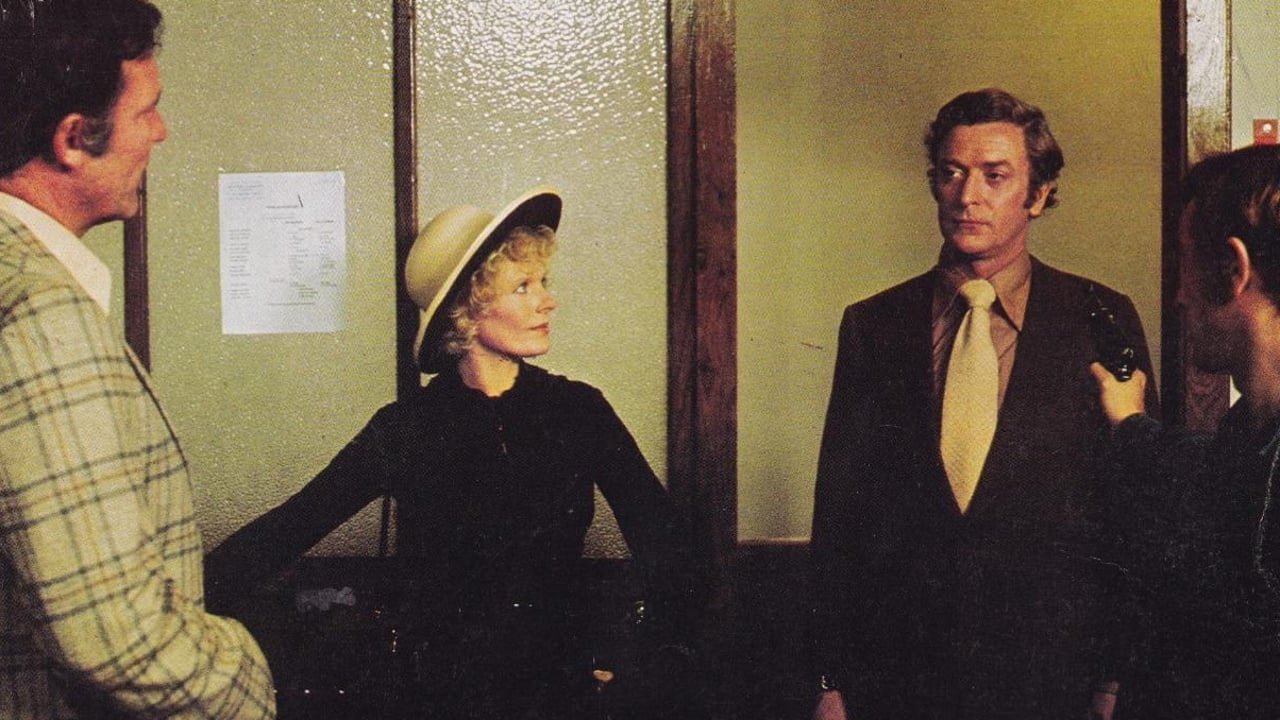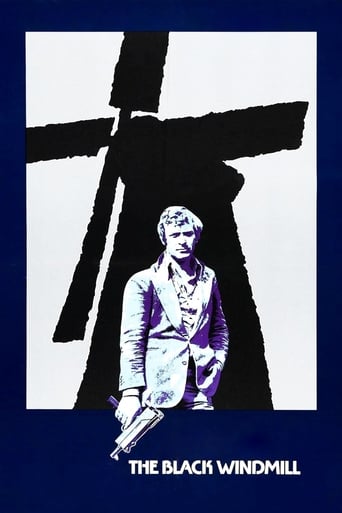

The Black Windmill combines the minds and talents of a certain American filmmaker named Don Siegel with a certain British actor named Michael Caine, between them coming up with this: a perfectly fine, if rather unspectacular and somewhat flimsy, thriller about kidnap; espionage; suspicion and stone-faced revenge. Three years earlier, each of the said men had had separate hits within the field of most of the above in the form of Get Carter and Dirty Harry, respectively; two films about cold-blooded and somewhat self centred men willingly going up against rather impossible odds to attain a sort of personal or moral parity. The films were lean and mean, thoroughly engrossing pieces featuring a lead actor some might say has never been better and a director handling particular material with the utmost care and attention. 1974's The Black Windmill takes the lead from one and the director from t'other, thus cooking up a tale which is again a combination of both Get Carter and Dirty Harry in the form of search and rescue melded with cold-hearted revenge before serving an edible enough dish which isn't as engaging nor as daring as the said films but is perfectly fine in its own right.Those expecting something anything better than either examples will be sorely disappointed, The Black Windmill far 'talkier' and dealing more with crime and investigative procedure in a way that sees its leads as more mature without the material actually being as mature. When Caine's character organises to meet up with his wife covertly and behind the backs of those whom trace them for whatever reason, they work out a series of codes or keywords that each of them know the other will immediately recognise, and it's all played out rather tactfully and routinely. Both leads in Dirty Harry and Get Carter probably wouldn't have even bothered with such things; wading on it, doing what needs to be done before wading on out again with a put-down not worried if anybody was hurt or offended as long as they got what they wanted. There was more of an immediacy to those attitudes complimenting those films, both a starker and franker atmosphere encapsulating the mindsets of the leads; where such methods were far more primitive, it was additionally far more daring; far bleaker and far more engaging in that manner they were.This film begins with two boys playing where they ought not be playing, less-so because of the sign telling them not to and more-so because a psychopathic criminal and his blundering accomplices plan on swiping the pair of them. We can tell something's not quite right with these military officials when they're picked up and brought back to a hangar; the headlights of a jeep obscuring clear view of those instigating the scenario and a female second in command revealing a little more leg than a more upstanding, respecting officer of her ilk might. Sure enough, they are taken and it is Michael Caine's father, John Tarrant, of one of the boys whom is the parental victim along with his wife Janet (Suzman). Tarrant is more broadly linked to the military, a British intelligence officer with the rank of major whom is working on another job at the time of the crime to do with other criminal dealings; the fact he has to pass on a stakeout mission for what arises suggests expertise within that field, specifically in both tracing and investigation whilst maintaining an anonymous presence, key items which will help in his eventual quest.The impact of his son's taking is made all the more affecting when the time comes for he and Janet to first find out what exactly has happened; the calling of their house by the enemy, a certain individual identifying himself as Drabble, allowing the voice of Tarrant's son David on the phone and Siegel allowing Janet's pained reaction fill our screens. The film toys as to whether Tarrant himself might be in on it, Caine's minimalist reactions and reserved response to the situation causing certain higher-ups to question his integrity and if he isn't, then only adding to the professionalism and cold-bloodedness his character surely embodies. With a ransom demanded, fingers pointing in every-which-way and everybody rather perturbed at everything and everyone else, the stage is set for Caine to embark on a treacherous mission encompassing danger and death to try and fetch his son and use violence as a means of getting even. The film is a firmer and more calculating effort in its depiction of both revenge-seeking as well as people-finding; a film heavier with plot which in itself isn't necessarily as water tight as one would have liked and only really allowing Caine to step out of the boundaries of the law in a stable but more watered-down manner when compared to the unperturbed, pulpy brute force of certain other anti-heroes in certain other earlier examples whom you felt were frothing-at-the-mouth mad dogs let loose from their collars and on a mission to attain what they wanted.Siegel does just about enough to keep everything moving along, the odd narrative hiccup here and there not necessarily pasted over enough for it to not be as glaring as it is, while the post-Q's workshop/sub-James Bond gadgetry sequences of a certain briefcase being introduced purely so that it may be used later on are a little strange. Regardless, the cast play it as straight as they can and Caine goes along with his own post-Ipcress File/sub-Jack Carter incarnation of a military man on a mission, beginning with the worst case scenario and ending with a framework favourite: the descent into Hell; all in all, working relatively well and engaging the viewer on a basic level of narrative complexity twinned with slight observation on supposedly ever increasing corruption within the state itself's most trusted.
... View MoreI watched this movie and at first I was going to stop. There is swearing in the first 10 or 15 minutes and after that no more. Michael Caine is a good actor who is some kind of secret agent whose son is kidnapped for money and diamonds. He goes to great lengths to get the government officials to help him get his son back who about 10 years old but they refuse to give him the diamonds. Then he does what a good father does. He snoops around his bosses offices finds the info he needs and get the diamonds out of a safe deposit box.He then has to meet up with the criminals who get lots of joy causing pain to people they capture or need. His son is heard screaming in calls to him in pain. Michael Caine is on the run from bad and good people. Lots of physical stunts. Very violent movie, I could not wait for it to be over but it was a good movie full of action and intrigue.Warning>>> in one of the scenes a woman takes off her coat is nude and proceeds to lay in a bed. Her boss takes a picture of her to make it look like MC is a compromised agent. Michael Caine is a good man and does not know the picture is taken in his room. The crime team leaves other things to make him look guilty to his boss and the police.
... View MoreFor this work, scenes of "action", a Don Siegel specialty, are less significant than those that generate characterization and plot, functioning to release tension rather than keep it at bay, although the director's customary taut pacing and stoniness are here, within a twisty story largely faithful to its source, a Clive Egleton novel: "Seven Days to a Killing", strongly scripted by Leigh Vance to further define the character-focused film. A cleverly fresh storyline involves a kidnapping, the victim being son of MI-5 operative John Tarrant (Michael Caine), with a ransom demand for greater than one half million pounds worth of uncut diamonds that are resting within a Defence Ministry safe, as an unknown traitorous official has informed the abductors, with subsequent dual scenario devices of Tarrant's struggle to retrieve his son held by illicit arms syndicate villains, along with Ministry efforts to culpably link Tarrant with the conspiracy. The film benefits from attention to continuity, no loose ends rupturing one's concentration, with heed to detail perhaps its primary strength, yet telling contributions come from many, including players Caine, who adds a needed element of engagement to his Harry Palmer persona, Delphine Seyrig giving a splendidly nuanced performance as companion of the principal evildoer (played with effectual guile by John Vernon), and Donald Pleasence earning the acting laurels here as a dispassionate MI-5 security chief, along with Clive Revill, Joss Ackland, and ever intense Janet Suzman.Siegel's hand is apparent in the spare deployment of music, with scoring and silence each appropriately employed; palette and filter for well-composed cinematography and montage (shooting is in London, Paris and the Sussex countryside); a symbolic use of clothing colours; and accomplished post-production efforts, all increasing the worth of a piece undervalued by some reviewers, indeed by Caine himself, unfortunate in the event as the film is one of Siegel's finest, his skill with improvisation mating well with capable workmanship.
... View MoreI've read several comments that point out the clumbsiness of the action editing in "The Black Windmill." I think what is being overlooked is that what we have been seeing for the past thirty years on tv and video has been a pan-and-scan version of a Panavision film. The action was designed for a widescreen and we've only been seeing half of it, sloppily panned-and-scanned, making it seem jumbled. I believe that the widescreen dvd release will prove me right.Admittedly, in terms of Siegel action-drama quality,this flick falls in the middle ground between the great "Dirty Harry" and the so-so "Telefon." But even the low-budget Telefon is much more exciting in its original wide aspect ratio than in "full" screen.
... View More